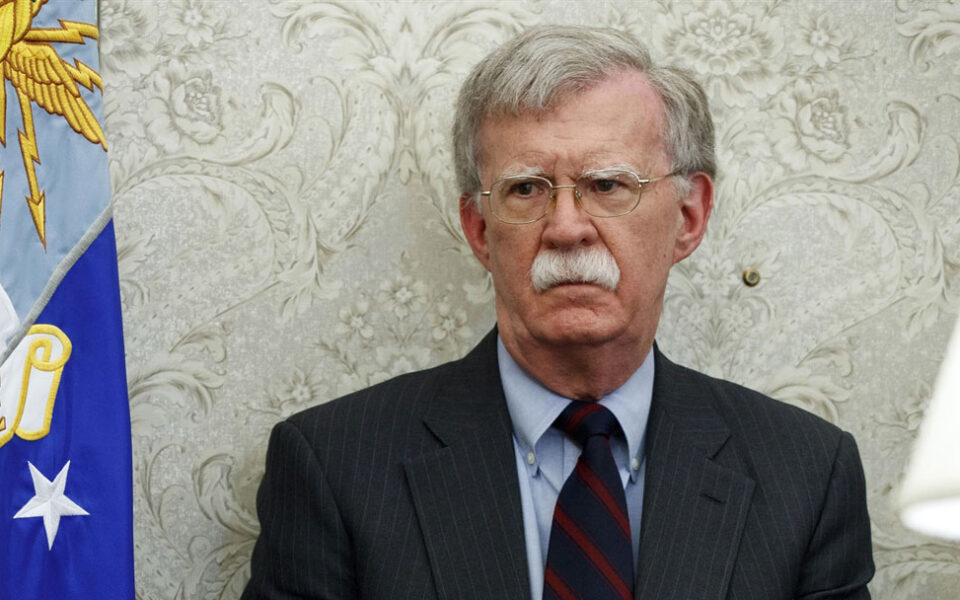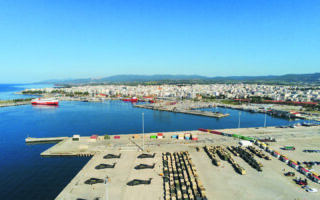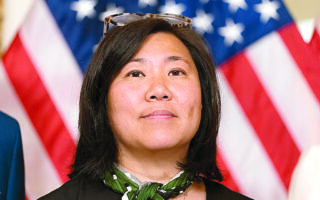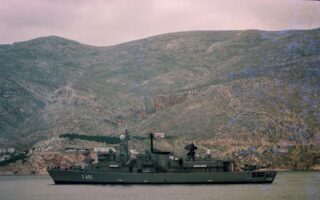‘The US has not really pressed Turkey’
Former national security adviser says Greece’s role in NATO is enhanced by Ankara’s recalcitrant stance on a range of issues

John Bolton is not your standard diplomat, but a tough realist of the international scene. US national security adviser in 2018-2019, he opposed Donald Trump’s intentions to normalize relations with Iran and Russia – the “authoritarian players,” as he tends to call them – and was driven to resignation. In his book “The Room Where It Happened” he criticizes Trump’s decisions on hot issues in the Middle East and China and reveals the “sabotage” he brought about in 2019, together with Israeli Prime Minister Benjamin Netanyahu and Secretary of State Mike Pompeo, on Washington-Tehran diplomatic relations.
Today, Bolton supports Greece’s upgraded role in the Eastern Mediterranean and criticizes Turkish President Recep Tayyip Erdogan’s stance on the recent expansion of the North Atlantic Alliance. On the occasion of the Erdogan-Mitsotakis meeting in New York, the long-serving diplomat spoke to Kathimerini.
How do you see the outcome of the NATO Summit in Vilnius affecting the stability and security in the Eastern Mediterranean?
Obviously, there are still many unanswered questions stemming both from the war in Ukraine and from the position that Turkey has taken and continues to take on a range of issues. The problems posed by Turkey in many respects to Swedish membership indicate that we still have a lot of work to do. And I think the US has not really pressed Turkey as hard as it should on this issue. So, instability and tension in the Eastern Mediterranean will continue to exist in the near future.
What key elements should be included in a new geopolitical architecture for the Black Sea region?
I think the question of access into the Black Sea by non-Black Sea powers is not satisfactorily resolved by the Montreux Convention. I think that has been the feeling of the United States for a long time and this feeling has been around since the Cold War. Today, the Black Sea has a different geostrategic importance than it did in the 1930s. And I think the war in Ukraine has demonstrated the inadequacy of the Montreux Convention. And maybe this is not something that Erdogan wants to hear. But I think we have got to have discussions on what we are going to do in the wake of hopefully the successful conclusion of the Ukraine war.
There are intense rumors of discussions about the possible revision of the Montreux Convention. If these are true, how might a revised Montreux Convention impact the balance of power in the Black Sea?
The answer to the question depends on how much of the Russian Black Sea fleet is still floating at the conclusion of the war. I mean, the Ukrainians have done substantial damage to it, sinking the flagship, among other things, while in a recent raid, they took out a landing craft and a submarine. But the nature of the Black Sea has fundamentally changed and the geostrategic reality is different. Therefore, the US position on the Dardanelles and the Bosphorus is the same as similar passages, such as the Suez Canal and the Panama Canal, that they are open to free transit by not just commercial vessels but by military vessels.
‘As long as Erdogan is in power, the tensions between Greece and Turkey on historical issues have risen and fallen over the years. But Erdogan is a provocateur’
Now, in times of war, any agreement is subject to being changed by the state through which the narrow waterway runs. But at other times, exemplified by the war in Ukraine, I think we need a different formulation. I am sure Turkey is not going to like that, but we would have to look at provisions that could give them some security. But it is just not acceptable now to say that non-Black Sea naval vessels do not have free access to the Black Sea.
The US leadership and the Pentagon seem to attach great priority to the development of a military base in Alexandroupoli, the so-called “Souda 2.” What is Greece’s role in the new US strategy for the Black Sea and the Eastern Mediterranean?
I think Greece has an important role, not just for the Black Sea, but really for the larger context in the Mediterranean. We are now seeing developments in the Middle East and in Africa that will have a huge effect on Europe. As a Mediterranean nation, the position of Greece is going to be absolutely critical. So, I would favor a more extensive US military presence and cooperation with Greece if that is acceptable to the government.
Also, I think we have got to look at Greece playing a larger role within NATO councils, and this is something that other Eastern European countries and NATO would support. Now we have to look at the new configurations of threats to the Alliance as a whole. I mean, part of the threat is embodied in one of the allies themselves in Turkey. And that is a separate problem, as in this area there are a lot of potential economic and political opportunities to bring the Middle East and Europe closer together. And I think frankly it is going to require a larger US presence, and Greece is the natural place for that to take place.
Given that Turkey disputes Greece’s sovereign territory and the boundaries of the exclusive economic zone (EEZ), how can the United States contribute to promoting cooperation and de-escalation between Greece and Turkey?
Well, I am not optimistic on that front. I have to say, as long as Erdogan is in power, the tensions between Greece and Turkey on historical issues have risen and fallen over the years. But Erdogan is a provocateur. He has caused trouble in the Alliance over Finland and Sweden. He has caused trouble with Israel. He is causing trouble with Greece all the time. His role in the Ukraine war has been mixed at best, and really his desire to keep Turkey in the Alliance, I think, remains open to question. Now, maybe he will focus on getting Turkey’s economy back in shape, which is what he ought to do, given the damage that he has done to it over the past several years. And that may make him more responsible. But if he continues to get his way because he is the “squeaky wheel,” it will just encourage more of Turkey’s negative behavior. On the other hand, I think closer cooperation between Greece, the United States, and the United Kingdom will deal with this Turkish question. Maybe that would help give us a way through.
Recently, President Erdogan has been manifesting a more diplomatic approach to Greek-Turkish relations. Do you consider that there has been a change in Erdogan’s strategy toward Greece?
I think what he is trying to do at the moment in the wake of his recent re-election is try to calm down different areas so he does not have so many problems on his plate at once. But some of these are not going to go away. The problem with the Kurds in eastern Turkey, for example, with the cutoff of the Kurdish pipeline, with the disputes between the Kurds and the central government of Iraq, and the implications they have for the Kurdish regions and in southern and eastern Turkey. And the economy, which his policies have helped drag down, has to be reformed. So, he has got a lot of domestic problems.
My sense is that Erdogan is trying to reduce the number of problems he has to deal with. I do not think that means he will make any substantive concessions, but I think he will try and put the temperature down. In some areas, relations with Greece may be one so he can focus on his other problems.
Forty-nine years after the invasion of Cyprus the Cyprus dispute remains the biggest thorn in Greek-Turkish relations. Do you see any possible solution being discussed?
I do not see any prospect of change there. I mean, the division and the UN peacekeeping force there. As you say, it is nearly 50 years. This is what happens when you create a UN peacekeeping force. It becomes permanent, in this case, along the border with the so-called “Turkish Republic of Northern Cyprus,” which is illegitimate. I think the answer is to give the government of Cyprus back to the people of Cyprus. Do not partition it, which is obviously what it is now. Unfortunately, I do not see any Turkish government, let alone Erdogan, agreeing to any significant change there in the near term.
There is much speculation that Trump had friendly relations with Erdogan, while the current president, Joe Biden, is more oriented toward good relations with the Greek leadership. Based on your experience, are these claims valid, and how did bilateral relations between Greece and the United States evolve during your term of office?
I think Biden has actually gone out of his way to try and mollify Erdogan. The shipment of F-16s presumably associated with Turkey, accepting Sweden into NATO, and not pressing on sanctions on the purchase of the Russian S-400 air defense system really indicate Biden’s certainly trying to get improvements in Turkey’s behavior in ways I think are mistaken. You know, Trump has gone back and forth with Erdogan when they were imprisoning and trying Pastor [Andrew] Brunson, and we put enormous pressure on them to get Brunson released, ultimately successfully. But Trump has an attraction to authoritarian figures like Vladimir Putin, Xi Jinping and Erdogan. But I cannot explain that. I just know it is true.
Look, I think Turkey under a responsible government is a critical member of NATO geographically because of the straits, the Bosphorus and the Dardanelles, and because of Turkey’s position in the Middle East. Under Erdogan, it has been more of a problem. And, you know, anchoring NATO’s southeastern flank is ever more important in the current world. And if the Turks are not willing under the Erdogan government to step up responsibly, then I think that just increases the importance of Greece and the role that it is prepared to take on, because we need a strong NATO presence in the Mediterranean. We do not have enough naval vessels, and it will take time to make more. And so, I think a stronger NATO requires a more vigorous Greek involvement.





